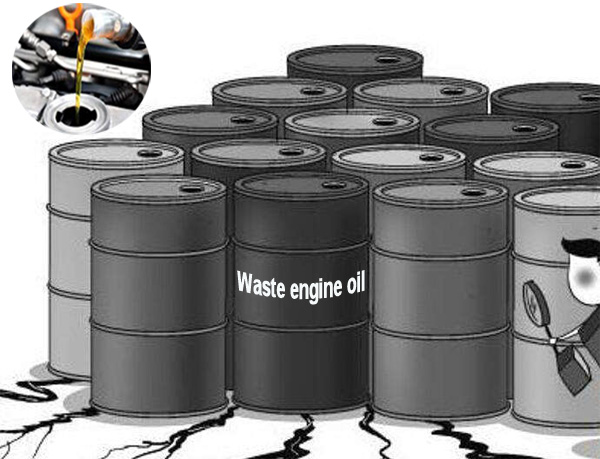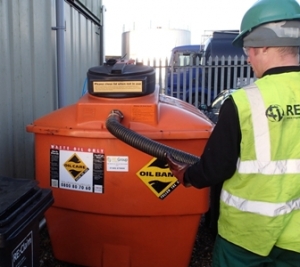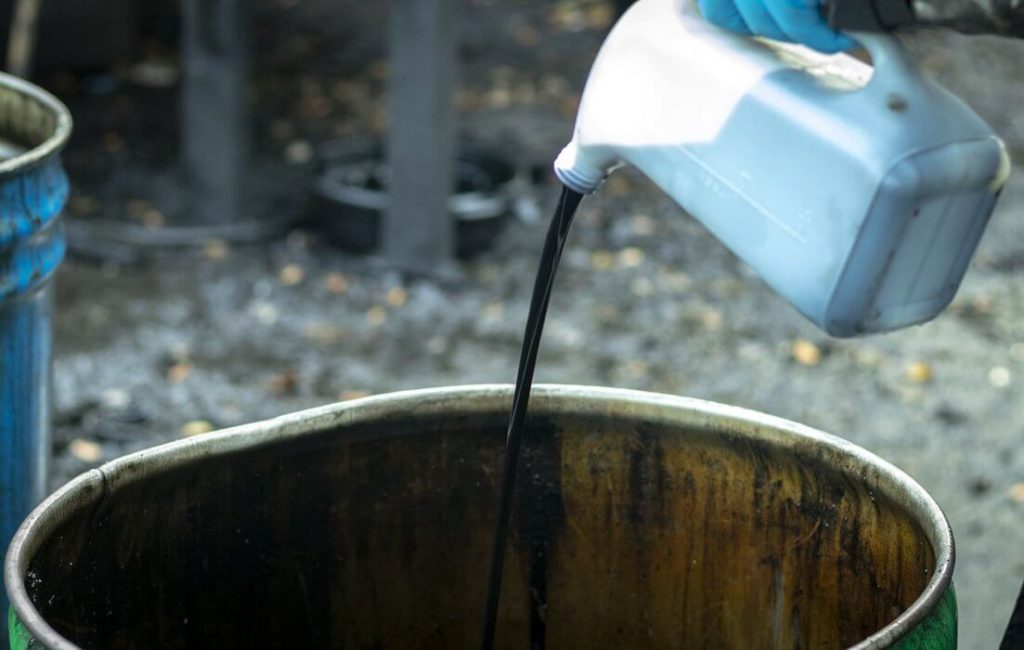Waste oil disposal involves safely getting rid of used oil to prevent environmental harm. Proper disposal ensures compliance with regulations and protects ecosystems.
Waste oil, often a byproduct of industrial processes, can be hazardous if not managed correctly. Safely disposing of waste oil is crucial for environmental protection and public health. Recycling or properly disposing of used oil prevents soil and water contamination.
Many service stations and recycling centers offer disposal services. Businesses generating waste oil must follow local regulations for disposal. Educating employees on proper disposal methods can help ensure compliance. Safe waste oil disposal practices benefit the environment and community health. Always choose licensed facilities for waste oil disposal.
Importance Of Proper Waste Oil Disposal
Proper waste oil disposal is crucial for protecting the environment. It prevents harmful substances from contaminating our natural resources. Additionally, it helps in maintaining the health and safety of communities. Disposing of waste oil properly is a responsibility we all share.
Environmental Impact
Improper waste oil disposal can harm the environment. Waste oil contains toxic substances that can pollute water and soil. This pollution affects plants, animals, and aquatic life. Contaminated water can kill fish and other aquatic organisms.
Oil spills on land can destroy vegetation. This leads to soil erosion and loss of habitat for wildlife. Waste oil can also seep into groundwater. This makes it unsafe for drinking and irrigation. Proper disposal helps prevent these environmental disasters.
Health Risks
Waste oil poses significant health risks to humans. It contains harmful chemicals such as heavy metals and carcinogens. These substances can cause serious health issues.
- Skin contact: Can cause skin irritation and dermatitis.
- Inhalation: Breathing in vapors can lead to respiratory problems.
- Ingestion: Accidental ingestion can result in poisoning.
Children and the elderly are particularly vulnerable to these health risks. Ensuring proper disposal is essential to protect public health.

Credit: m.wastetireoil.com
Types Of Waste Oil
Waste oil comes in many forms. Each type needs special disposal. Let's explore the common types of waste oil.
Motor Oil
Motor oil is used in vehicles. It keeps engines running smoothly. Over time, it gets dirty. Dirty motor oil can harm the environment. It's important to dispose of it properly.
- Used in cars, trucks, and motorcycles.
- Must be recycled or disposed of at designated centers.
Cooking Oil
Cooking oil is used in kitchens. It's common in restaurants and homes. Used cooking oil can clog drains. It also attracts pests. Dispose of it correctly to avoid problems.
- Used in frying and baking.
- Can be converted to biofuel.
Industrial Oil
Industrial oil is used in factories. It lubricates machinery. This oil can contain harmful chemicals. Proper disposal is critical for safety.
- Used in manufacturing and heavy machinery.
- Often requires special disposal methods.
| Type of Waste Oil | Used In | Disposal Method |
|---|---|---|
| Motor Oil | Vehicles | Recycling centers |
| Cooking Oil | Kitchens | Biofuel conversion |
| Industrial Oil | Factories | Special disposal methods |
Collection Methods
Proper waste oil disposal is crucial for environmental health. Understanding the various collection methods helps in managing waste oil efficiently. This section delves into two main collection methods: DIY Collection and Professional Services.
Diy Collection
Collecting waste oil at home can be simple. Follow these steps to ensure safety and efficiency:
- Use proper containers: Always use clean, sealable containers.
- Label containers: Clearly mark the containers as "waste oil".
- Store safely: Keep the containers in a cool, dry place.
- Avoid contamination: Do not mix waste oil with other substances.
DIY collection is budget-friendly and accessible. It requires careful handling to avoid spills and contamination. Regularly check local guidelines for disposal locations.
Professional Services
Professional services offer a convenient and safe solution for waste oil disposal. Here are some benefits:
- Expert handling: Professionals ensure proper collection and disposal.
- Compliance: They follow local regulations and guidelines.
- Convenience: Scheduled pickups and larger capacity handling.
Many companies offer waste oil collection services. They provide containers and pickup services, ensuring hassle-free disposal. Opting for professionals guarantees that the oil is disposed of responsibly.
| Method | Advantages | Considerations |
|---|---|---|
| DIY Collection | Cost-effective, Immediate access | Requires careful handling, Regular transport to disposal sites |
| Professional Services | Safe, Compliant, Convenient | Service fees, Scheduling pickups |
Recycling Waste Oil
Recycling Waste Oil is a crucial step in environmental protection. Instead of disposing of used oil, recycling offers a sustainable alternative. This process not only saves resources but also reduces pollution. Let's explore how waste oil is recycled and the benefits it offers.
Re-refining Process
The re-refining process involves several stages to clean used oil. First, the oil is collected from various sources. It is then filtered to remove large particles. The oil undergoes a heating process to separate impurities. This process is known as distillation.
Next, the oil is treated with chemicals to remove any remaining contaminants. This stage is called hydrotreating. Finally, the oil is vacuum distilled to produce a high-quality product. The result is clean, reusable oil.
Uses Of Recycled Oil
Recycled oil has many uses. It can be used as a lubricant in engines. This helps in reducing wear and tear. Recycled oil is also used in industrial applications. It acts as a hydraulic fluid and transformer oil.
Additionally, it can be used in the production of new products. This includes asphalt and roofing materials. Here’s a quick list of common uses:
- Engine lubricants
- Hydraulic fluids
- Transformer oils
- Asphalt production
- Roofing materials
| Application | Benefits |
|---|---|
| Engine lubricants | Reduces friction and wear |
| Hydraulic fluids | Ensures smooth machinery operation |
| Transformer oils | Insulates and cools transformers |
| Asphalt production | Provides a durable road surface |
| Roofing materials | Enhances weather resistance |
Safe Storage Tips
Proper waste oil disposal is essential for environmental safety. It also ensures compliance with regulations. Safe storage of waste oil prevents accidents and contamination. Below are some tips for storing waste oil safely.
Proper Containers
Use containers specifically designed for waste oil storage. These containers should be durable and leak-proof. Choose containers made from materials resistant to oil and chemicals.
- Metal or plastic containers with tight-fitting lids.
- Containers should be in good condition, without rust or cracks.
- Ensure containers are large enough to hold the waste oil.
Labeling And Handling
Proper labeling is crucial for safety and compliance. Clearly label each container with the words "Waste Oil". Include the date when the oil was added to the container.
- Use waterproof labels to prevent smudging.
- Write in large, readable letters.
Handle waste oil containers with care. Avoid spills and overfilling. Always wear protective gear such as gloves and goggles.
- Transfer oil using a funnel to prevent spills.
- Keep containers in a well-ventilated area.
- Store away from heat sources and direct sunlight.
Following these tips ensures safe storage of waste oil. It helps protect the environment and comply with regulations.

Credit: oilcare.org.uk
Legal Regulations
Proper waste oil disposal is essential for environmental safety. It is also crucial for legal compliance. Various laws govern the disposal of waste oil. These laws ensure safe handling and prevent environmental harm. Below, we explore the specific regulations that you must follow.
Local Guidelines
Each area has its own local guidelines for waste oil disposal. These guidelines are designed to protect the environment and public health. Check with your local waste management authority to understand your responsibilities.
- Identify local waste disposal facilities.
- Follow specific procedures for safe disposal.
- Use approved containers for waste oil.
Local guidelines may also include:
| Requirement | Description |
|---|---|
| Labeling | Ensure all containers are clearly labeled. |
| Storage | Store waste oil in a secure location. |
| Transport | Use certified transport services for disposal. |
Penalties For Improper Disposal
Improper disposal of waste oil can lead to severe penalties. These penalties are designed to enforce compliance and protect the environment.
- Fines: You may face heavy fines for illegal disposal.
- Legal Action: Authorities can take legal action against violators.
- Business Impact: Non-compliance can affect your business reputation.
Ensure you follow all legal requirements to avoid these penalties. Stay informed about the regulations in your area. Proper disposal practices protect both the environment and your business.
Diy Disposal Tips
Disposing of waste oil correctly is crucial for our environment. DIY disposal tips can help you manage waste oil efficiently. Here are some simple methods that you can follow.
Household Solutions
Household solutions can make waste oil disposal easier.
- Use a container with a tight lid for waste oil.
- Store the container in a cool, dry place.
- Label the container to avoid confusion.
Never pour waste oil down the drain. It can harm your plumbing and the environment. Instead, collect it in a safe container. You can then take it to a recycling center.
| Item | Action |
|---|---|
| Cooking Oil | Cool and store in a container |
| Motor Oil | Store in a leak-proof container |
Community Programs
Community programs offer convenient waste oil disposal options.
Check if your community has a waste oil collection program. Many towns offer drop-off points for waste oil. Some even have curbside pickup services.
- Find your nearest collection center.
- Transport your waste oil safely.
- Follow the guidelines for disposal.
These programs ensure that waste oil is disposed of properly. They prevent contamination and promote recycling.
Benefits Of Eco-friendly Disposal
Eco-friendly disposal of waste oil provides numerous benefits. It helps protect the environment and supports sustainability.
Sustainability
Eco-friendly waste oil disposal promotes sustainability. It reduces pollution and conserves natural resources. Proper disposal prevents harmful substances from entering water sources. This protects aquatic life and ensures clean drinking water.
Recycling waste oil reduces the need for new oil production. This saves energy and resources. It also reduces greenhouse gas emissions. By supporting eco-friendly disposal, you contribute to a healthier planet.
Economic Advantages
Eco-friendly disposal offers economic advantages. Businesses save money by recycling waste oil. Recycled oil can be processed and reused. This reduces the cost of purchasing new oil.
Proper disposal also helps avoid fines and penalties. Regulations require safe disposal of waste oil. By following eco-friendly practices, businesses stay compliant and avoid legal issues.
Eco-friendly disposal supports the circular economy. Waste oil is converted into valuable products. This creates jobs and boosts economic growth.

Credit: www.mosil.com
Frequently Asked Questions
What Is Waste Oil Disposal?
Waste oil disposal is the process of safely getting rid of used oil.
Why Is Waste Oil Disposal Important?
Proper disposal prevents environmental contamination and health hazards.
How Do You Dispose Of Waste Oil?
Take waste oil to a recycling center or authorized disposal site.
Can Waste Oil Be Recycled?
Yes, waste oil can be refined and reused.
What Types Of Oil Are Considered Waste Oil?
Used motor oil, hydraulic oil, and lubricants are waste oils.
Is Waste Oil Hazardous?
Yes, waste oil contains contaminants and can be harmful.
What Happens To Recycled Waste Oil?
Recycled oil is cleaned and repurposed for various uses.
How Often Should Waste Oil Be Disposed Of?
Dispose of waste oil after each oil change or as needed.
Can I Mix Waste Oil With Other Substances?
No, do not mix waste oil with other chemicals.
Where Can I Find Waste Oil Disposal Locations?
Check local government websites or recycling centers for disposal sites.
Conclusion
Proper waste oil disposal protects our environment and health. Follow the guidelines and dispose of waste oil responsibly. Recycling waste oil is essential. Ensure you use certified disposal centers. Together, we can make a significant impact. Sustainable practices benefit everyone.
Thank you for your commitment to a cleaner planet.